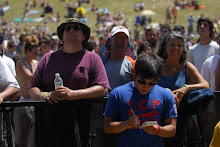
‘Modern Rock’ isn’t a term included in Ketch Secor’s impressive lexicon. In fact, while Secor’s band, Old Crow Medicine Show, is a part of an underground music scene only growing in size today, his music is far from modern.
And yet as the string quintet hits Homestead tonight, the immediacy and power of Old Crow’s take on classic American folk and bluegrass speaks to modern times perfectly.
The band, which released the record Tennessee Pusher last fall, has been purveying traditional tunes and like-minded original songs for almost a dozen years. Secor, Old Crow’s fiddler, banjoist and harmonica player, called from Nashville to talk shop about keeping America’s musical traditions fresh.
Gravity Rides Everything: So the new record came out last fall. How have fans reacted?
Ketch Secor: It’s been a really positive feeling out there in all the towns we’re playing. We got people singing along to all the new material. Just got back from Texas. It’s been going great — we did a lot of growing with the record.
GRE: How do you feel the band’s style has evolved over the years?
KS: We’ve sharpened that feel we had all along. It’s been refined. We’ve been playing together for 11 years. At that point, you don’t really get a new sound, you just get better at the sound you’ve always had.
GRE: What was different about Tennessee Pusher than previous records?
KS: Well, we included a full drum kit and an organ on this record. But the biggest difference is that this album is all original material. In years past, we’ve always had a majority of traditional music on the album.
GRE: Looking at the album half a year later, is there anything you would’ve done differently?
KS: No, it really felt like it was the best it could’ve been. I must say I feel that way about all our records. Generally, in live shows you have the regret. ‘Oh, I should’ve said this. I forgot to say we were in Steubenville.’ But when it comes to making a record, you get the chance to make it right. You don’t get a second take onstage.

GRE: Do you feel the same kind of personal connection to the traditional songs as your originals?
KS: Yea, definitely. When you make your mark on a song, or that song on you, you can form a bond with a song. It’s like if you found out your brother was adopted — but you never treated him like he was. You loved him all along. I mean, we’re in a string band. The music I love is rooted in those traditions. The feeling you get playing traditional music, it’s not like a cover tune.
GRE: What’s a record in your collection that might surprise me?
KS: I have a lot of music from Mexico and the folk music of South Texas. But then I also really like Cyndi Lauper.
GRE: Do you feel the band is playing an important role by exposing traditional American songs to a new audience?
KS: To turn on young people to American music traditions is no small feat, considering how removed today’s young people are from the oral traditions and cultural events that lead to the passing on of this knowledge. If your parents aren’t telling you about singing and dancing, then who is? The radio and television media, of course, is just homogenous and disconnected from that source too.
I mean the radio is so homogenous and we’re all guilty of falling into it, myself included. But it’s hard to get through to people who’ve been exposed to that much bad music.
Some people out there, they hear us play and they know that it’s right. They feel that whatever they heard before is somehow not pleasing enough. We’re fairly lovable — we get all your senses. We have a musical force that’s so much more than ourselves. We’re carrying on the torch of a genre that is the root of so much of what people like about pop music.
If you like Chuck Berry, you’ll like us. If you like Little Richard, you’ll like us. But also if you like Kurt Cobain, you’ll like us.
GRE: How would you describe the atmosphere at an Old Crow show?
KS: It’s pretty fired up. There’s a lot of excitement. But it depends where you are. We just played a lot of Texas venues that were dancehalls, so they had their belt buckles properly postured and they were swingin’ their gals around. There are hearts being broken and some promises being made.
-Fin-
Please, if you will. Enjoy this music. It's the truth.





